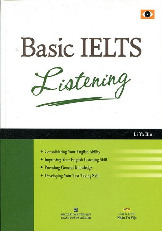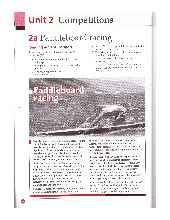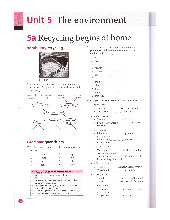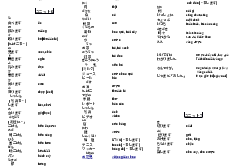












Preview text:
lOMoAR cPSD| 61099620
TENSES IN ENGLISH (CÁC THÌ TRONG TIẾNG ANH)
SIMPLE PRESENT (THÌ HIỆN TẠI ĐƠN): FORM: POSSITIVE NEGATIVE QUESTION (+) (-) (?) KHẲNG ĐỊNH PHỦ ĐỊNH CÂU HỎI Ex: They are dogs. Ex: They aren’t dogs. Ex: Are they dogs? She is a doctor. She isn’t a doctor. Is she a doctor? TO BE S + am/is/are S + am/is/are + not Am/Is/Are + S ? Ex: We shouldn’t go. Ex: Should we go? Ex: We should go. Peter can’t swim. Can Peter swim? MODAL Peter can swim. VERBS
S + Modal Verb + not + Modal Verb + S + S + Modal Verb + Vo Vo Vo ? Ex: I like cats. Ex: I don’t like cats. He goes to school. He S + V1/V-s/V-es doesn’t S + don’t/ +Vo Ex: Do I like cats? go to ORDINARY Does he go to school? He/She/It school. VERBS doesn’t Do/Does + S + Vo? He/She/It USAGES:
1) The earth goes around the sun. Water boils at 100C.
=> THÌ HIỆN TẠI ĐƠN DIỄN TẢ 1 CHÂN LÍ, 1 SỰ THẬT HIỂN NHIÊN. 2) We never drink beer.
She often goes to school late.
=> THÌ HIỆN TẠI ĐƠN DIỄN TẢ 1 THÓI QUEN, HÀNH ĐỘNG LẶP ĐI LẶP LẠI Ở HIỆN TẠI. Signal words: Luôn luôn (=every: mỗi) Thường xuyên Thường thường
Thường (= regularly/ normally) Thỉnh thoảng Đôi khi, thỉnh thoảng Hiếm khi Rất hiếm khi (= hardly) Không bao giờ
VỊ TRÍ CỦA CÁC TRẠNG TỪ CHỈ THƯỜNG XUYÊN: Ex: lOMoAR cPSD| 61099620
- I often get up at 6:00 o’clock. ->
TRƯỚC ĐỘNG TỪ THƯỜNG
- She is always late for school. -> SAU ĐỘNG TỪ TO BE
3) The train leaves at 10 o’clock next week.
The bus comes at 6:30 tomorow.
=> THÌ HIỆN TẠI ĐƠN DIỄN TẢ 1 LỊCH TRÌNH ĐÃ LÊN SẴN ( xe lửa, máy bay, trận đấu,... )
• Nếu động từ tận cùng bằng O S CH X SH Z (Ông Sáu chạy xe SH zề)
• Chủ ngữ là He/She/It Ex: I go miss watch fix brush buzz You He She It We They
Đứng trước “y” là PHỤ ÂM
Đứng trước “y” là
NGUYÊN ÂM (UE OAI ) I cry fly try play have You He She It We They lOMoAR cPSD| 61099620 lOMoAR cPSD| 61099620
PRESENT CONTINUOUS/PROGRESSIVE Form:
(+) S + am/is/are + V.ing
(-) S+ am/is/are + not + V.ing
(?) Am/Is/Are + S + V.ing? (=>) Yes, S+ am/is/are. No, S+ am/is/are + not.
Ex: He is swimming now. He isn’t swimming now. Is he swimming now ? Usage: 1. Now I am studying English
We are working for Pepsi company.
=> THÌ HTTD diễn tả hành động đang xảy ra tại thời điểm nói. Signal: Now At the moment
Currently (hiện thời) -> đứng giữa tobe và V-ing Right now At present Today
Ex: Every day, I go to school by bus. Today, I am going to school by car. 2.
Look ! The teacher is coming. Listen ! The birds are singing.
=> Sử dụng thì HTTD sau câu mệnh lệnh. 3.
Tomorrow, we are planting a tree.
I am learning French this summer.
=> THÌ HTTD diễn tả 1 hành động sẽ xảy ra trong tương lai và có sự chuẩn bị trước.
( như thì TƯƠNG LAI
GẦN: am/is/are + going to+ Vo: dự định sẽ) Signal:
Tomorrow This summer/evening/... Next week/month/...
*Note: NẾU ĐỘNG TỪ LÀ GO & COME THÌ TA DÙNG HTTD THAY TLG
Ex: Tomorrow, I am going to the zoo.
Tomorrow, I am going to go to the zoo. 4.
You are always talking in class. They are always coming late.
Mary is always leaving her dirty socks on the floor for me to pick up.
AM/IS/ARE + always/ currently/often + V-ing
=> Diễn tả sự bực mình, phàn nàn của người nói về 1 hành động lặp đi lặp lại ở hiện tại
Note: Không dùng hiện tại tiếp diễn đối với các động từ sau: - To be - Seem (dường như)
- Love/like/hate/dislike/enjoy/want/need (nhận thức) lOMoAR cPSD| 61099620 - See/notice
(thấy/nhận thấy) Smell(ngửi/có mùi) Taste(nếm/có vị) Hear (nghe/nghe thấy) Feel (cảm thấy) - Start/ begin
- Belong/have/ own (sở hữu)
PRESENT PERFECT ( THÌ HIỆN TẠI HOÀN THÀNH ) Form: (+) S + have/has + V3/ed. (-) S + have/has + not + V3/ed. (?) Have/Has + S + V3/ed ? (=>) Yes, S + have/has. No, S + have/has + not.
Ex: I have learnt English for 5 years.
I have not learnt English for 5 years.
Have you learnt English for 5 years ?
Note Have not = haven’t / Has not = hasn’t Usage: 1)
She has lived here for 10 years.
They have studied English since 2000. =>
THÌ HTHT diễn tả 1 hành động đã bắt đầu xảy ra từ quá khứ nhưng vẫn còn kéo dài cho đến
đến hiện tại. (signal words: since / for) 2)
We have gone to Taiwan 3 times.
Tom has watched that movie several times. =>
THÌ HTHT diễn tả 1 hành động lặp đi lặp lại trong quá khứ và ta nhớ số lần thực hiện.
(signal words: times (lần)) 3)
Your eyes are red. Have you cried ?
She has sold her car. Now, she takes the bus to school every day.
=> THÌ HTHT diễn tả 1 hành động xảy ra và chấm dứt ở quá khứ nhưng kết quả vẫn còn ở hiện tại. Signal words : lOMoAR cPSD| 61099620
never: chưa từng (ở thì HTĐ: ‘never’ có nghĩa là ‘không bao giờ’ ) (đứng giữa have & V3)
ever: đã từng (đứng giữa have & V3) _> dùng trong câu hỏi
before: trước đây (đứng cuối câu)
already: rồi (đứng giữa have & V3, hoặc đứng cuối câu)
just: vừa mới (đứng giữa have & V3)
recently = lately : gần đây (đứng đầu hoặc cuối câu)
not… yet: chưa (yet: đứng cuối câu)
so far = until now = up to now = up to present: cho đến bây giờ (đứng đầu hoặc cuối câu)
since + MỐC THỜI GIAN ( since 2016 / since I was born ): kể từ
for + KHOẢNG THỜI GIAN ( for 5 years ): được bao lâu rồi
- It’s the first time/ This is the first time + HTHT
- Trước Since dùng HTHT, sau since dùng QKĐ Ex: I have played guitar
since I was three.
They have lived here since I was a boy.
NOTE: PHÂN BIỆT SIMPLE PAST & PRESENT PERFECT Ex: I visited Hanoi in 2000. I have visited Hanoi.
HÀNH ĐỘNG ĐÃ XẢY RA VÀ CHẤM DỨT TRONG QUÁ KHỨ, nếu:
- BIẾT RÕ thời gian -> dùng QKĐ
- KHÔNG BIẾT RÕ thời gian => dùng HTHT
SIMPLE PAST (QUÁ KHỨ ĐƠN) Form: S + V2/ ed lOMoAR cPSD| 61099620 Usage:
2) QKĐ diễn tả 1 việc đã xảy ra và chấm dứt trong quá khứ (thông thường ta biết rõ thời gian thực hiện hành động) Ex:
- Yesterday, I went to the zoo.
- Mary visited her grandparents 2 weeks ago.
3) QKĐ diễn tả 1 chuỗi hành động xảy ra trong quá khứ. Ex:
- Yesterday morning, I woke up, I got out of bed, I ate breakfast and I went to school. Signal words: - Yesterday - Ago (cách đây)
Ex: Two days ago, four weeks ago,…
- Last (vừa rồi, vừa qua)
Ex: Last week, last month, last year,… - In + năm trong quá khứ Ex: In 2000, in 1990, … PAST CONTINUOUS
Form: S + was/were + V-ING Usages:
1) Yesterday, I was playing the piano from 3pm to 5pm . Yesterday, I was playing the piano at 3pm .
QUÁ KHỨ TIẾP DIỄN diễn tả hành động diễn ra tại 1 thời điểm cụ thể hoặc trong 1 khoảng thời gian
cụ thể trong quá khứ Signal: at this time at that time+
thời gian trong quá khứ (yesterday, ago, in+ năm trong quá khứ, last) at + giờ from…to… 2) This morning,
while I was having a breakfast, the postman came.
Last night, when the children were watching TV, their mom came home. ( long action ) Past ( //////// x /////// ) now ( short action )
Trong QK, 1 hành động dài đang diễn ra thì 1 hành động ngắn cắt ngang.
Hành động dài dùng QKTD – Hành động ngắn dùng QKĐ lOMoAR cPSD| 61099620
3) Last night, while I was watching TV, they were playing the piano.
Yesterday evening, we were singing while they were watching TV.
QKTD diễn tả những hành động xảy ra song song, cùng 1 lúc trong quá khứ. * while: trong khi * when: khi
4) Last year, he was always talking in class.
Was/were + always + V-ing
QKTD diễn tả sự bực mình, phàn nàn của người nói về 1 việc lặp đi lặp lại nhiều lần trong quá khứ. PAST PERFECT Form: S + had + V3/ed Usage:
- Last night, I had closed all the windows before I went to bed.
- Last night, I went to bed after I had closed all windows.
- I had met him before World War I
Hoặc: 2 hành động xảy ra trong quá khứ:
- Hành động xảy ra trước: Qúa khứ hoàn thành
- Hành động xảy ra sau: Qúa khứ đơn Signal: after (sa
u khi), before (trước khi), up to then (cho tới lúc đó) -
Up to then, I had never seen such a big house. SIMPLE FUTURE NEAR FUTURE
S + will/shall + Vo: sẽ
S + am/is/are + going to + Vo (dự định sẽ) lOMoAR cPSD| 61099620
1) A: David is in the hospital. Last night, he had
1) A: David is in the hospital. Last night, he had an accident. an accident.
B: Wow, really ? I will visit him tomorrow.
B: I know. I am going to visit him tomorrow.
DIỄN TẢ 1 QUYẾT ĐỊNH TỨC THỜI NGAY LÚC
DIỄN TẢ 1 DỰ ĐỊNH TRONG TƯƠNG LAI, CÓ KẾ NÓI.
HOẠCH VÀ SỰ CHUẨN BỊ TRƯỚC.
2) Look at the black clouds. It’s going to rain.
2) In 2020, people will have 5 heads.
DIỄN TẢ 1 TIÊN ĐOÁN TRONG TƯƠNG LAI
DIỄN TẢ 1 TIÊN ĐOÁN TRONG TƯƠNG LAI
NHƯNG CÓ BẰNG CHỨNG CỤ THỂ.
NHƯNG KHÔNG CÓ BẰNG CHỨNG CỤ THỂ.
NOTE: đối với go/come => KHÔNG CHIA NEAR
3) Next 3rd November, she will be 5 years old.
FUTURE MÀ CHIA SIMPLE PRESENT CONT.
DIỄN TẢ 1 CHÂN LÍ/SỰ THẬT CHẮC CHẮN
Ex: Tomorrow, I’m going to the zoo. XẢY RA TRONG TƯƠNG LAI 4) Promise Expect (mong/ trông (hứa)/ mong) Think / Hope / Probably (hi / (có lẽ) vọng) => SỬ DỤNG SIMPLE FUTURE Ex: I promise I will come.
We expect you will win the game. Signal words: - Tomorrow (ngày mai)
- Next (next week/month/year/ …)
- In + khoảng thời gian (in 2 weeks: trong 2 tuần tới, in three months: trong 3 tháng tới, …)
NOTE: TO BE TO DO S.T: dự định làm gì
- Audrey and Jimmy are to get married in June. lOMoAR cPSD| 61099620 FUTURE CONTINUOUS Form: (+) will be + V_ing (-) won’t be + V_ing (?) Will + S + be + V_ing ?
DIỄN TẢ 1 HÀNH ĐỘNG XẢY RA TRONG 1 THỜI ĐIỂM hoặc TRONG 1 KHOẢNG THỜI
GIAN CỤ THỂ TRONG TƯƠNG LAI. Ex:
Tomorrow, I will be playing the piano from 3pm to 5pm.
Tomorrow, I will be playing the piano at 3pm. Signal: at this time at that time+
thời gian trong tương lai(tomorrow, next, in+ khoảng thời gian) at + giờ from…to… FUTURE PERFECT Form: (+) WILL HAVE + V3/ED (-) WON’T HAVE + V3/ED (?) WILL + S + HAVE + V3/ED ?
Usage:- We will have finished our homework by the time you comeback.
- She will have made a cake by noon.
2 hành động xảy ra trong tương lai, hành động nào xảy ra trước thì dùng TLHT, hành động nào xảy ra sau thì dùng HTĐ TENSE Present Perfect Cont. Past Perfect Cont. Future Perfect Cont. Signal words: by/ by the time
NOTE: By (trước)/ By the time (trước lúc) S + V1 Before/after As soon as (ngay khi) Until (cho đến khi) When
S + HAVE/HAS + V3 => nhấn m ạ nh tính trước sau của hành động Future Meaning
Ex: W e will you a letter when we a rrive th er e.
I will go to bed after I have finished my homework. lOMoAR cPSD| 61099620 (+) HAVE/HAS + BEEN + VING HAD + BEEN + VING WILL HAVE BEEN + VING (-) HAVE/HAS + NOT + BEEN + VING HAD + NOT + BEEN + VING WON’T HAVE BEEN + VING (?) HAVE/HAS + S + BEEN + VING ? HAD + S + BEEN + VING ? WILL + S + HAVE BEEN + VING?
Usage:Thì HTHTTD giống cách sử dụng thì HTHT
NHƯNG các thì hoàn thành tiếp diễn nhấn
Thì QKHTTD giống cách sử dụng thì QKHT mạnh tính liên tục/kéo dài của hành động Thì
TLHTTD giống cách sử dụng thì TLHT
Tip: wait/live/study/learn/sleep/drive/write/teach/look for => DÙNG HT/QK/TL hoàn thành tiếp diễn. Ex: - I have waited for you.
- I have been waiting for you for 3 hours.
- She has lived here for 2 years.
- She has been living here for 2 years. lOMoAR cPSD| 61099620
The Most Common Irregular Verbs List
BẢNG ĐỘNG TỪ BẤT QUY TẮC V0 V2 V3 Meanin V0 g V2 V3 Meaning be was/were been k Thì, now là ở knew known Biết bear bore born Sinh ra lead led led Dẫn dắt beat beat beaten Đánh bại learn learnt learnt Học become became become Trở thành leave left left Rời đi begin began begun Bắt đầu lend lent lent Cho mượn bet bet bet Cá cược let let let Để bite bit bitten Cắn lie lay lain Nằm blow blew blown Thổi lose lost lost Đánh mất broadcast broadcast broadcast Phát sóng break broke broken Làm v make ỡ made made Làm bring brought brought Mang mean meant meant Ý nghĩa build built built Xây meet d ựng met met Gặp burn burnt burnt Đố pay t cháy paid paid Trả buy bought bought Mua put put put Đặt, để can could C r ó ea th d ể read read Đọc ride rode ridden Cưỡi catch caught caught Bắt, chụp ring rang rung Rung choose chose chosen Chọn come came come ri Đ s ế e n rose risen Mọc lên cost cost cost r Tr un ị giá ran run Chạy cut cut cut s Cắ ay t said said Nói do did done s Làm ee saw seen Nhìn draw drew drawn s V el ẻ l sold sold Bán dream dreamt dreamt s Mơ end sent sent Gửi drink drank drunk s U et ố ng set set Đặt, để drive drove driven s Lá ho i x ot e shot shot Bắn eat ate eaten Ăn show showed shown Chỉ ra fall fell fallen Ngã, rơi shut shut shut Đóng feed fed fed Cho ăn sing sang sung Hát feel felt felt Cảm thấy sink sank sunk Chìm fight fought fought Đánh sinhau t sat sat Ngồi find found found slTìm eep slept slept Ngủ fly flew flown s Bay pe ak spoke spoken Nói forget forgot forgotten s Quê pe n nd spent spent
Trải qua, tiêu tiền freeze froze frozen s Đóng tand stood stood Đứng băng steal stole stolen Trộm get got got Lấy, đi stick stuck stuck Dán give gave given Đưa swim swam swum Bơi go went gone Đi
understand understood understood Hiểu grow grew grown Mọc, trồng hang hung hung Tr tak eo e took taken Lấy have had had Có teac h taught taught Dạy tell told told Kể lOMoAR cPSD| 61099620 hear heard heard Nghe think thought thought Suy nghĩ hide hid hidden Giấu throw threw thrown Ném hit hit hit Đánh wake woke woken Đánh thức hold held held Giữ, cầm wear wore worn Mặc hurt hurt hurt Làm đau win won won Chiến thắng keep kept kept Giữ write wrote written Viết



